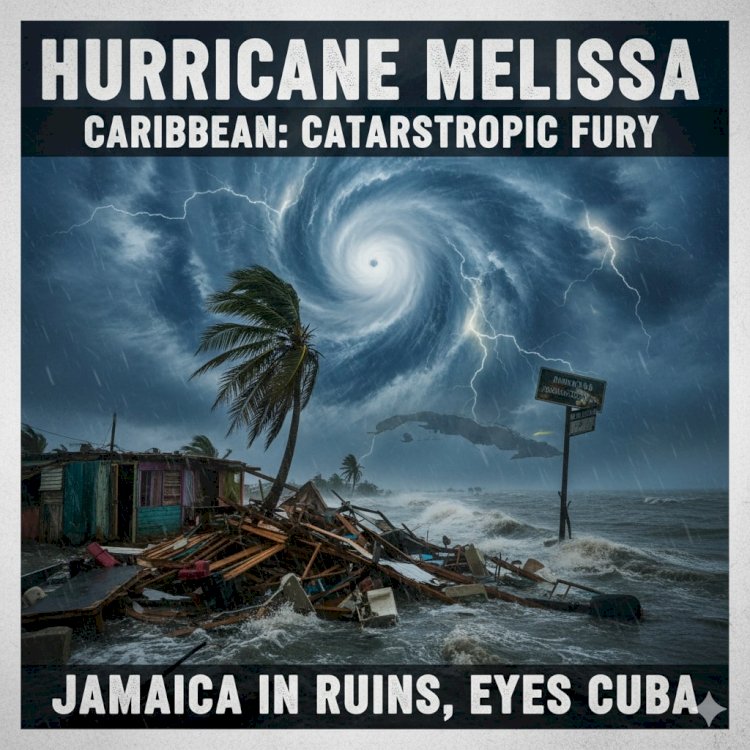Hurricane Melissa Batters Caribbean: Catastrophic Fury Leaves Jamaica in Ruins, Eyes Cuba

Monster Storm Slams Jamaica as Category 5, Claims First Lives
Kingston, Jamaica, October 29, 2025 – Hurricane Melissa, a colossal force of nature that roared to life as the strongest Atlantic storm on record, unleashed its wrath on the Caribbean Tuesday, carving a path of devastation through Jamaica before barreling toward Cuba. With winds peaking at 175 miles per hour, the Category 5 behemoth battered the island nation, toppling homes, snapping power lines, and triggering deadly floods that have already claimed at least three lives. As rescue teams fan out amid the wreckage, forecasters warn that Melissa's fury is far from spent, with Cuba now squarely in the crosshairs.
The storm's landfall near Black River in southwestern Jamaica early Tuesday morning marked a grim milestone: the most powerful cyclone to ever strike the island directly. Waves as tall as buildings crashed against the coastline, while howling gusts shredded banana plantations and hurled debris like shrapnel through bustling towns. In Kingston, the capital, residents huddled in makeshift shelters as torrential rains—some areas seeing up to 30 inches in hours—turned streets into raging rivers. "It's like the sky is weeping blood," one evacuee whispered from a crowded school gymnasium turned refuge, her voice drowned by the ceaseless patter of water on tin roofs.
A Trail of Twisted Debris and Shattered Dreams
Across Jamaica, the aftermath paints a tableau of heartbreak. In the southern parish of St. Elizabeth, where Melissa's eye made its closest pass, entire fishing villages lie in splintered heaps. Roofs peeled away like banana skins, vehicles marooned in mudslides, and power outages plunged hundreds of thousands into darkness. The Jamaican Constabulary Force released harrowing footage of officers wading through waist-deep muck in Black River, past crumpled power poles and vehicles half-buried in sediment. "Our infrastructure is severely compromised," declared Prime Minister Andrew Holness in a dusk address, his face etched with resolve. "But Jamaicans are resilient. We will rebuild, stronger than before."
The human toll mounts with each passing hour. Three fatalities—a fisherman swept out to sea and two others lost to collapsing structures—serve as stark reminders of Melissa's lethal embrace. Hospitals overflow with the injured, from broken limbs to waterborne ailments, as emergency crews battle impassable roads to deliver aid. In the eastern mountains, where rainfall could exceed 40 inches, isolated communities remain cut off, their pleas for help crackling faintly over spotty radios. The storm's slow crawl amplified the deluge, turning wadis into waterfalls and hillsides into landslides that buried roads and homes alike.
Cuba Braces for the Onslaught
As Melissa emerges from Jamaica's rugged spine, weakened but still a formidable Category 4 with 145 mph winds, it hurtles northwest toward Cuba's eastern shores. Forecasters predict landfall near Santiago de Cuba late Tuesday or early Wednesday, where the storm could regain strength over warm Caribbean waters before downgrading to a Category 3 upon hitting land. But it's the rain that terrifies most: 10 to 20 inches forecast across the plains, ballooning to 25 inches in the Sierra Maestra mountains, portending biblical floods and mudslides in a nation still scarred by past tempests.
In a nation of stoic preparation, over 735,000 Cubans have been evacuated from low-lying areas, herded into sturdy state shelters or the homes of relatives inland. President Miguel Díaz-Canel toured flood-prone zones in Santiago, urging calm amid the gathering gloom. "It will be a very difficult night for all of Cuba, but we will recover," he posted on social media, as families boarded up windows and stockpiled canned goods. Along the coastline, fishermen like Ramón García lashed boats to docks and herded cattle to higher ground, their faces weathered by decades of defiant survival. "We've danced with Gilbert and Ivan," García said, referencing infamous predecessors. "Melissa is fiercer, but Cuba bends, it doesn't break."
Echoes of a Warming World
Melissa's meteoric rise—from a mere tropical depression to Earth’s most intense storm of 2025 in mere days—lays bare the accelerating wrath of climate change. Fueled by record-hot ocean temperatures, the hurricane intensified with unnatural speed, its kaleidoscopic eye a mesmerizing harbinger of doom from satellite views. Scientists point to greenhouse gases trapping heat in the Atlantic, supercharging storms that were once outliers into routine nightmares. For small island nations like Jamaica and Cuba, the irony stings: bearing the brunt of a crisis sown by distant polluters, with limited resources to weather the storm.
Across the broader Caribbean, Melissa's outer bands have already doused the Dominican Republic and Haiti in sheets of rain, flooding neighborhoods in Santo Domingo and exacerbating woes in tent cities still reeling from earthquakes and unrest. The Bahamas, next in the storm's projected path, eyes a glancing blow by Thursday, while Bermuda braces for a Thursday night brush with hurricane-force winds and drenching downpours.
A Glimmer of International Solidarity
Amid the chaos, glimmers of hope emerge. The United States, deploying Urban Search and Rescue teams and a Disaster Assistance Response squad, pledged swift aid to affected nations—though critics note the shuttering of USAID earlier this year has hampered rapid response. The United Nations, too, mobilizes supplies, airlifting tents, water purifiers, and medical kits to Jamaica's battered airstrips. In Havana, international envoys huddle with Cuban officials, coordinating evacuations and fortifying dams against the impending surge.
As Melissa churns onward, churning up waves that crash like thunder, the Caribbean holds its collective breath. In Kingston's sodden streets, volunteers distribute meager meals to the displaced, their laughter a defiant spark against the gloom. In Santiago's shadowed alleys, children peer from shelter windows, dreaming of blue skies beyond the storm. For now, the hurricane rages—a tempest of wind and water that tests the soul of a region. But in its wake, as the waters recede and the sun pierces the clouds, the people of the Caribbean will rise, mending what was broken, one resilient heartbeat at a time.

 content-team
content-team 


















